- Home
- Tristan Bancks
My Life and Other Stuff That Went Wrong Page 3
My Life and Other Stuff That Went Wrong Read online
Page 3
‘You’re good,’ I say. ‘Let me get the camera.’ I run out of the garage, up the back steps and grab Nan’s camera off the dining table. I am only gone for ten seconds, but by the time I get back Nan is pinned beneath the barbell and her face is bright red.
‘Nan!’ I pull the barbell off her chest. ‘Are you okay?’
I sit her up. She leans forward. I wonder if she has broken something.
‘Did you get a picture?’ she asks.
‘No, Nan. I didn’t get a picture.’
‘Maybe tomorrow,’ she says, standing up unsteadily, before flopping back down onto the milk crates. ‘I might need my supplemental oxygen, love. Grab the canister and mask from under my bed. That’s a good boy.’
The next two weeks are hardcore. Five o’clock, every morning. Weights, sprints on her walking frame, chin-ups. Meanwhile, across town, Jack is training his nan for Everest, too. They fit her cart out with snow tyres and chains. He thinks she’s going to win. And she probably will.
One morning, on our way home from training, I try to talk Nan out of the whole Everest idea. ‘I heard that it’s best to attempt Mt Kilimanjaro first, that it’s easier.’
‘I don’t have time for Mt Kiliwhatchamacallit. I’m seventy-five years old. I’ll probably be dead before the year’s out.’
‘But Everest takes seven weeks. And, Nan, I read that with airfare, permits, climbing gear, sherpas and everything, it costs about forty-thousand dollars. How will you afford it?’
‘I have a few dollars tucked away,’ she says, tapping the side of her nose. When we get home she shows me all this money under her mattress. Some of the notes I don’t even recognise. She reckons she’s been sticking it there for thirty-five years. ‘I never trusted banks,’ she says. ‘Or your grandfather.’
I tell her I’ve been reading on the internet about hypothermia, frostbite and how you can get sunburn in your nostrils from the reflection off the snow. So, next day, she buys a whole bunch of stuff from the op-shop where she helps out on Tuesdays, including makeshift nostril protectors and thermal underwear (which she insists on showing me).
The night before the Battle of Cemetery Hill, this is the conversation at dinner:
‘How’s Nan?’ Mum asks.
‘Good,’ I say.
‘Is she still going to climb Mt Everest?’
‘This is delicious,’ I say, scooping up a spoonful of cauliflower in ham sauce. ‘Was this from a recipe or …’
‘Tom?’
‘Nah, she’s given up,’ I say.
‘Why are you still going over to her place so early?’
‘Just to … help her out. With jobs and stuff.’
Mum looks me in the eye. ‘Are you sure?’
‘Yeah. As if she’s going to climb Mt Everest. She’s not crazy!’
But Mum knows that this is not entirely true.
Oof. Oof. Oof.
That’s what I hear as we make our way through the early-morning dark towards the starting line. Nan click-clacks along next to me. It’s a warm morning and I’m in thongs and shorts, but Nan is dressed head to toe in her op-shop outfit – sheepskin boots, ski goggles, knitted gloves, a ski jacket three sizes too big, a deer-hunting cap with woollen earflaps, and her pearl necklace and handbag. The part of her face not hidden by the goggles glows with sweat.
Oof. Oof.
We turn the final corner and, up ahead, in a pool of street lamplight, I see Jack sitting on the bonnet of his nan’s motorised granny cart. He is holding a punching bag and Sue is smacking it with her bare knuckles like she’s got something to prove.
When we reach the starting line I say, ‘Racing in a motorised cart is cheating.’
Jack turns to Nan. ‘Hey there, little old lady.’
Sue punches the bag one last time. Jack falls off the front of the cart and lands on his head.
‘Ow.’
Sue’s angry-looking black-and-white dog snarls at us from the back of the cart. It has a container hanging off its collar, like the small wooden keg you might see around a St Bernard’s neck.
‘All right,’ Sue grunts, throwing a small Australian flag down to me. ‘First one to plant their flag between the boneyard gates wins. And no foul play this time, you got it? On your marks …’ She turns the key, revs the accelerator. ‘Get set …’
‘Go!’ Nan calls, taking off into the dark, slightly faster than a snail.
‘Get outta my way, numbskull!’ Sue screams at Jack, who is still lying in front of the cart, rubbing his head. Sue jerks forward, rolling over his toe, squishing it beneath a monster-truck wheel.
‘Owww!’ Jack clutches his foot.
I run a few steps to keep up with Nan – she’s really moving.
Beeep! Sue slams her hand on the horn. ‘Outta my way!’ she calls as her cart moves up next to us, headlamps lighting the road ahead. ‘You haven’t got a hope. And you look ridiculous in that outfit, by the way.’
Sue veers sharply to the left, trying to steer us off the road and into a ditch.
Nan adjusts her ski goggles but doesn’t say a thing. She focuses on the road ahead.
‘My dad was a world-class mountain climber!’ Sue shouts over the annoying hum-buzz of the cart engine.
‘What?’ Nan lifts one earflap on her deer-hunting cap.
‘I said my dad was –’
‘I don’t care if your dad was Sir Edmund Hillary,’ Nan says. ‘I can see you’re a whopping great woolly mammoth riding a motorised buggy. How are you going to get that thing up Everest?’
Sue sneers. ‘It’s the Sherpa 5000, top of the line. It’s the Tenzing Norgay of granny carts.’ She floors the accelerator, taking the lead. She veers in front of us and drops something off the back of her cart. I hear the tinkling of metal on tar and, in the red glow of her tail-lights, I see something sharp. Thumbtacks. Dozens of them all over the road.
I try to steer Nan around the tacks, but I’m too late. We walk right through them. Nan doesn’t notice them in her thick-soled sheepskin boots, but my thongs are like a bed of nails.
‘Ow. Ow. Ow. Ow.’
I want to stop and pick out the tacks, but Nan continues climbing so I suck up the pain and follow. ‘Ow. Ow. Ow.’
‘You okay, love?’ Nan asks.
My thumbtacked soles go click-click on the road while Nan goes click-clack.
‘Sort of,’ I say, trying to ignore the pain roaring through my feet.
Sue is several metres ahead and mutters something over her shoulder to her evil dog. She reaches around and twists the lid of the container on its neck. The dog gives a husky snicker and leans forward. Something tips from the container and spills onto the road in a pool.
I’m distracted by Nan taking a huff on her asthma puffer.
‘Are you okay?’ I ask.
‘Fine, love. You?’
She is sweating like crazy and starting to slow down.
‘How about we take your jacket off, Nan?’
‘No, I’m right. If I’m complaining about the weather now, imagine what I’ll be like when I arrive in Nepal in May.’
‘Aargh!’ Nan screams and we both slip and fall on our backsides.
Jack limps past in the darkness, laughing.
My hands are covered in black stuff. Oil, maybe. Nan groans.
‘Are you okay?’
‘Just my hip, love. I’ll be right. Can you help me up?’
I try to stand but I slip again before struggling to the edge of the oil slick.
‘Grab my hand,’ I say and pull Nan to her feet. She has black stains all over her new clothes.
‘She’s ruined my outfit.’ Nan waves a fist at Sue. ‘You beast!’
Sue scruffs her dog on the neck as the cart continues up the hill. She is about ten metres ahead of us with thirty metres to go.
‘This means war,’ Nan says, reaching into her handbag.
Sunlight colours the sky to the east and I can see the old iron gates at the top of the hill. Gargoyles look down at us from
pillars on either side.
Nan hands me a small, paper-wrapped package. ‘Plan B,’ she says.
‘But –’
‘Do it!’ she tells me.
So I do the thing we planned, even though I know it’s wrong. I creep up behind the cart, careful not to be seen in Sue’s rear-view mirror, but the dog barks like mad. I unwrap the package to reveal half a kilo of bacon strips, and saliva drips from the dog’s angry, barking jaws.
I try to stuff one of the strips into the chunky tyre tread as the wheels turn, but I almost burn the tips of my fingers off. I try again and manage to jam one strip of bacon in. Then two, three, four, five strips before the dog launches itself off the cart, barking midair, ready to finish me.
I stop, drop and roll away from the vehicle, down the hill. The dog hits the ground and I wait for it to maul me, to gobble me up like a strip of free-range bacon. But, instead, Nan’s plan begins to work. The dog turns to the cart and bites one of the tyres in an attempt to get at the bacon. It howls in pain but then tries to bite the tyre again.
‘What are you doing?’ Sue screams at the possessed dog.
It nips and barks and bites until it is almost sucked up by the turning wheel. Then there is a hissing sound from the tyre, and the cart leans dangerously to the right.
Further down the hill, my nan wheezes: ‘Take that!’
‘That’s not fair!’ Jack yells.
Click-clack-click-clack-click-clack.
Nan catches up to Sue just as we hit the final steep section of hill. The last ten metres. Sweat storms down her forehead and sunken cheeks.
‘Can’t I take your jacket, Nan?’
‘No, I’m fine,’ she says, slurring her words. She shuffles forward, then falls. I reach out to catch her, but I miss and her head goes conk on the road.
‘Nan!’ I slip an arm beneath her and rest her head in my lap.
‘Thanks, love,’ she says groggily. ‘Feeling a bit woozy. You know, I didn’t realise Everest would be this hard. We must be above 8000 metres. Have you got the oxygen?’
I unzip her enormous ski jacket and roll her out. ‘It’s okay, Nan. The race is over. We’re throwing in the towel.’
‘But Everest,’ she says. ‘I have to get to the top. I have to beat that vile woman. I have to be the oldest …’
‘Forget Everest,’ I say, looking up at the cemetery gates just ahead. ‘It’s over.’ Looking down the hill, I see Sue’s cart several metres behind us, not moving at all now.
‘Help me down!’ Sue snaps at Jack.
‘But –’
‘No buts.’
Jack pushes and shoves and squeezes his enormous grandmother off the cart. She staggers and falls awkwardly to the road. ‘Help me up, you twit of a boy!’
‘I’m trying!’ he says. But Jack cannot budge her, no matter what he does. So Sue begins to crawl up the hill, groaning and scraping her way towards the top. Soon she is four metres behind us. Then three. Then two. She is like a maimed rhinoceros, inching her way along. I start to worry that she is going to roll right over us, mash us into the bitumen like road kill.
‘Oh, no you don’t,’ Nan says, catching sight of Sue. Nan pushes herself up and out of my arms, clutching the flag in her bleeding fist. I try to hold onto her but she slaps at my hand and starts to crawl up the steepest section of Cemetery Hill.
‘I’m going for the summit,’ she says. ‘Radio back to base camp. Let ’em know.’
I laugh at her joke. Then I realise that it isn’t a joke. I want to stop her, but I also don’t want to take away her moment of glory.
Sue crawls past me, so close I can smell her sweaty armpits and coffee breath. She is right on Nan’s tail. Nan doesn’t have a hope.
Sue reaches out a hand, glistening with sweat, and grabs Nan’s pearl necklace, pulling on it like reins to drag her back.
Nan makes a choking sound and Sue crawls forward.
‘Go, Nan!’ Jack shouts.
Sue heaves on the necklace once more and the pearls explode from around Nan’s neck and bounce onto the road, rolling downhill. Nan will not be pleased. Those pearls were given to her by her own mother, Hepzibah Worboys, my great-grandmother.
Sue’s hands land on a bunch of pearls, then the pearls roll beneath her knees and she scrambles and slips and squawks. Pretty soon, she’s rolling back downhill on an avalanche of pearls.
‘Help!’ Sue screams, trying in vain to get a grip on the road. Jack and the dog look up and attempt to leap out of the way – but too late. They are pinned to the front of the cart by Sue’s gargantuan body.
At that moment Nan claws her way through the cemetery gates, plants her flag and falls flat to the ground. Hunched gargoyles look down at her as the first rays of golden light touch her face.
‘I’ve done it, Tom! I’ve done it,’ she calls out triumphantly.
‘Yes, Nan.’ I smile and bend down next to her. ‘You’ve done it.’ I stroke her face, wiping some of the blood from her forehead. I can’t believe it’s over. My crazy grandmother thinks she has climbed Mt Everest.
‘Thanks for training me, Tommy.’
‘That’s okay, Nan.’
‘Just think. In three months’ time, I’ll be doing the real thing. I’ll be on top of the world!’
‘Ewww, you’ve got poo on your back,’ says a small voice behind me.
I turn to see a little punk with wingnut ears and a galaxy of freckles. He is staring at me.
‘No, I don’t,’ I say.
‘Yes, you do.’
‘It’s not poo. It’s my birthmark.’
‘What’s a birthmark?’ the kid asks.
Every year I dread it – the school swimming carnival. You’re not allowed to wear a rash vest in races. That means my dirty, no-good, big brown birthmark in the middle of my back (which my best friend Jack calls The Fig) is on parade for the whole school to see. The kid with the wingnut ears looks like he’s in Year Two. He’s lining up behind me at the dive blocks, waiting for his final race.
‘A birthmark,’ I explain through clenched teeth, ‘is a mark that you have from when you are born. Sorry if that’s confusing for you.’
‘Did the stork do a poo on you?’ the kid asks.
The little girl next to him laughs. I do not. I want to pick him up and throw him into the deep end. Instead, I lean in real close.
‘Did the stork do a poo on your face?’ I ask.
The kid’s smile drops. He looks at me. His bottom lip quivers. He looks like he’s about to start bawling. I look around, worried that a teacher is going to see. Then he stabs a finger at me and shouts, ‘Hey, everybody! Look at his back!’
Every kid and teacher within a thirty-metre radius, including the swimmers on the blocks about to dive in, looks at me – thirty or forty people, staring. Now my lip starts to quiver and I look like I’m going to start bawling. The starter gun fires for the race but only three kids dive in. The other five are trying to get a good view of my back.
I stomp on Wingnut’s toe.
‘Owwwwwww!’
I cover The Fig with my hand and make a beeline for the change rooms, marching all the way down the side of the Olympic pool. I can feel the crimson-red embarrassment of the kids watching and pointing and laughing. It’s the longest walk of my life, and when I reach the change rooms I want to cry.
It is empty and the pale-blue concrete makes the place feel cold. I stand in front of one of the basins. I reveal The Fig and turn to look at it in the dirty, soap-smeared mirror. ‘I hate you!’ I whisper to it. ‘You filthy, good-for-nothing swine. I’d probably be a swimming champion if it weren’t for you. I wish you were gone forever.’
I head into a toilet cubicle, slam the door, flip down the seat and slump onto it, head in my hands. In that moment I decide I will never go swimming again, never leave the house again, until I have had an operation to slice that thing off. In the distance I hear the starter gun go for the next race – my race.
‘Hello, Old Thing,’ says a fara
way voice.
I bend down to look under the toilet cubicle door, but I can’t see any feet.
‘No, no, up here!’
I stand and turn to see a small animal perched on top of the toilet, right next to the flush button. It is chocolate-brown with a few black patches, two tired little eyes and a sad mouth. It looks like an oval-shaped cookie with tiny arms and legs.
‘Rather nice to get a good look at your face, finally,’ it says. ‘I had the impression that you might be ugly, but you’re a handsome young man.’
I stare at the thing. If I didn’t know any better, I would say it looks a little bit like The Fig. A lot like it.
‘Anyway,’ it goes on, ‘I just wanted to say that there’s no need to hate me. It must be difficult for you at times, having a large birthmark like me, but you and I are blood brothers. Together forever.’ It gives me a wink. ‘To hate me would be to hate yourself, and that would be just plain silly.’
‘Who are you?’ I ask. ‘What are you?’
He looks at me like I am stupid. ‘I think you know.’
I reach around and my fingertips touch the skin in the middle of my back. It is smooth. No lumps, no bumps. It feels good.
‘What do you want from me?’ I ask.
‘Nothing, Old Chap. I just want to reach out to you, to let you know that I feel your pain. I heard what that horrible child said to you out there and I, too, wanted to throw him in the deep end.’
You read my thoughts? I wonder.
‘Of course,’ it says in response. ‘I think what you think. I feel what you feel. We are one and the same.’
Not anymore, I think to myself.
‘I heard that,’ he says.
I try not to think anything.
‘Anyway, I just wanted to let you know that I’m watching your back, okay? Hug?’ It stands on tippy-toes and holds out its little Fig arms, but I so don’t want to hug it.
I run my fingers over the smooth skin of my back again and it feels so good. I know what I have to do.

 On the Run
On the Run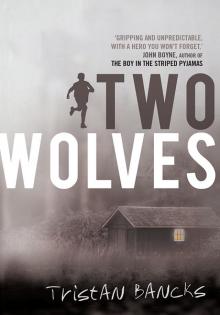 Two Wolves
Two Wolves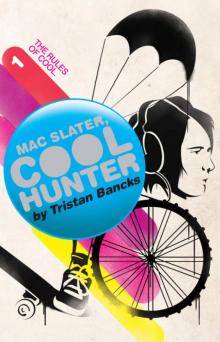 Mac Slater Coolhunter 1
Mac Slater Coolhunter 1 The Fall
The Fall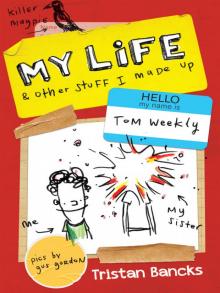 My Life and Other Stuff I Made Up
My Life and Other Stuff I Made Up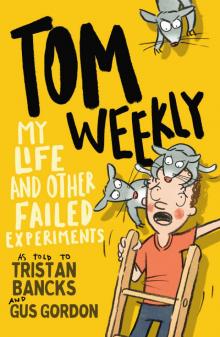 My Life and Other Failed Experiments
My Life and Other Failed Experiments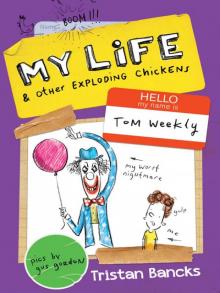 My Life and Other Exploding Chickens
My Life and Other Exploding Chickens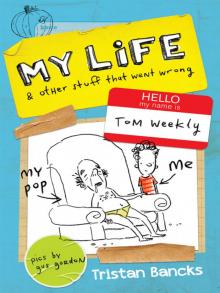 My Life and Other Stuff That Went Wrong
My Life and Other Stuff That Went Wrong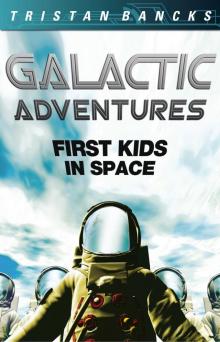 Galactic Adventures
Galactic Adventures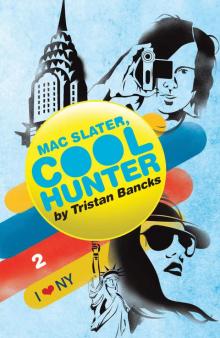 Mac Slater Coolhunter 2
Mac Slater Coolhunter 2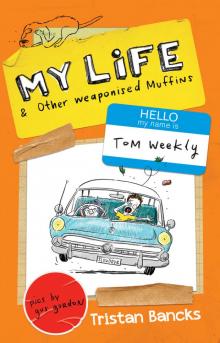 My Life and Other Weaponised Muffins
My Life and Other Weaponised Muffins